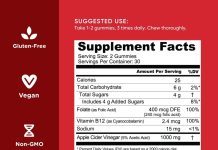Losing belly fat is a common goal for many of us, but it can be a daunting task to figure out the best approach. That’s why we’re here to help! In this article, we’ll reveal the foods that you should steer clear of if you’re looking to shed those stubborn pounds around your midsection. By avoiding these culprits, you’ll be well on your way to achieving a flatter stomach and feeling more confident in your own skin. Let’s get started on this journey towards a healthier, happier you!
Review contents
Processed Foods
Processed foods are a common staple in many diets today. They are convenient and easily accessible, but they often come with a long list of negatives. These foods undergo various manufacturing processes that alter their original state, often resulting in a loss of nutritional value. While they may be tempting due to their convenience, it is important to be aware of the potential downsides.
Overview of processed foods
Processed foods refer to a wide range of products that have been altered from their natural state. This includes foods that have undergone processes such as canning, freezing, drying, and packaging. These foods typically contain added sugars, unhealthy fats, and high levels of sodium, which can lead to negative health consequences when consumed in excess.
Hidden sugars and additives
One of the major concerns with processed foods is the high amount of hidden sugars and additives they contain. These added sugars can wreak havoc on our health, contributing to weight gain, tooth decay, and an increased risk of chronic diseases such as diabetes and heart disease. Additionally, the excessive use of additives, such as preservatives and flavor enhancers, can have negative effects on our overall well-being.
High in unhealthy fats
Processed foods are often high in unhealthy fats, such as trans fats and saturated fats. These fats are associated with an increased risk of heart disease, obesity, and inflammation. Consuming excessive amounts of these unhealthy fats can contribute to the accumulation of visceral fat, which is the fat that surrounds our organs and has been linked to various health problems.
Low in nutrients
Perhaps one of the biggest drawbacks of processed foods is their low nutritional value. During the processing and manufacturing process, many essential nutrients are lost or significantly reduced. This means that these foods provide empty calories, lacking the vitamins, minerals, and fiber that are important for our overall health and well-being. Opting for whole, unprocessed foods is a much better choice when it comes to providing our bodies with the nutrients they need.
Sugary Drinks
Sugary drinks are a major culprit in the rise of obesity and health-related issues. They are often referred to as “liquid calories” due to their high sugar content and lack of nutritional value. While they may be refreshing and tasty, it is important to be mindful of their negative impact on our health, particularly when it comes to losing belly fat.
Empty calories
Sugary drinks are filled with what we call “empty calories.” These are calories that provide little to no nutritional value. Instead of providing our bodies with important vitamins and minerals, sugary drinks simply add excess calories to our daily intake without any benefits.
High sugar content
One of the most concerning aspects of sugary drinks is their high sugar content. This can be deceiving as we often don’t realize just how much sugar is in these beverages. The excessive consumption of sugar can lead to weight gain, increased risk of chronic diseases, and negatively impact our body’s ability to regulate blood sugar levels.
Increased risk of obesity
Regular consumption of sugary drinks has been strongly linked to weight gain and an increased risk of obesity. These drinks can contribute to the buildup of visceral fat, which is the fat that accumulates around our internal organs and is associated with metabolic disorders and chronic diseases. Limiting or avoiding sugary drinks altogether can greatly help in reducing belly fat.
Negative impact on insulin resistance
Sugary drinks can also have a negative impact on our body’s insulin resistance. Insulin resistance is a condition where our cells become less responsive to insulin, a hormone that helps regulate blood sugar levels. When our body is unable to effectively process glucose due to insulin resistance, it can lead to weight gain, an increased risk of type 2 diabetes, and difficulty in losing belly fat.
Alcohol
While it may be enjoyable in moderation, alcohol can be detrimental when it comes to losing belly fat. It is important to be mindful of our alcohol consumption and its impact on our overall health and weight loss goals.
Calorie-dense without nutritional value
Alcoholic beverages are calorie-dense without providing any significant nutritional benefits. This means that when we consume alcohol, we are taking in a large number of calories without getting any essential nutrients in return. These extra calories can contribute to weight gain, especially when consumed in excess.
Promotes fat storage
When we consume alcohol, our body prioritizes metabolizing it over other nutrients we consume. This can lead to increased fat storage, as our body is storing the excess energy from alcohol instead of using it for other metabolic processes. Over time, this can contribute to the accumulation of belly fat.
Increases appetite
Alcohol has the ability to increase our appetite, leading to overeating and making poor food choices. This is often referred to as the “drunk munchies” effect, where we may find ourselves indulging in high-calorie and unhealthy foods while under the influence. These additional calories can contribute to weight gain and hinder our efforts to lose belly fat.
Leads to poor food choices
In addition to increasing appetite, alcohol can also impair our judgment and decision-making abilities. This can lead to making poor food choices, such as opting for unhealthy snacks or indulging in late-night fast food. These unhealthy food choices can further contribute to weight gain and undermine our efforts to lose belly fat.
Refined Grains
Refined grains have become a staple in the modern diet, but their consumption should be limited when aiming to lose belly fat. These grains have undergone processing that removes important nutrients, leaving behind a product that is devoid of fiber and essential vitamins and minerals.
Lack of fiber and nutrients
Refined grains, such as white flour and white rice, have had the fiber-rich bran and nutrient-rich germ removed during processing. This results in a product that is stripped of its beneficial components, leaving behind a carbohydrate-heavy food that lacks the fiber and essential nutrients found in whole grains.
Rapidly absorbed carbohydrates
Refined grains are quickly broken down into sugar by our bodies, leading to rapid spikes in blood sugar levels. This can cause an insulin response, which promotes fat storage and can contribute to belly fat accumulation. Opting for whole grains, which are higher in fiber and take longer to digest, can help regulate blood sugar levels and aid in weight loss efforts.
Raises blood sugar levels
Due to their rapid digestion and absorption, refined grains cause a sharp increase in blood sugar levels. Over time, this repeated blood sugar rollercoaster can lead to insulin resistance, a condition associated with weight gain and difficulty in losing belly fat.
Contributes to belly fat
The rapid spikes in blood sugar levels caused by consuming refined grains can contribute to the accumulation of belly fat. Excess sugar that is not immediately used by the body is converted to fat and stored, often around the abdominal area. Choosing whole grains over refined grains can help prevent these spikes in blood sugar and support a healthier weight.
Sweets and Pastries
Sweets and pastries may be a delightful indulgence, but their negative impact on our health and ability to lose belly fat cannot be ignored. These treats are loaded with added sugars, unhealthy fats, and empty calories, making them one of the top foods to avoid when aiming for a slimmer waistline.
High in added sugars
Sweets and pastries are notorious for their high added sugar content. Consuming excessive amounts of added sugars can lead to weight gain, an increased risk of chronic diseases, and difficulty in losing belly fat. It is important to be mindful of the sugar content in these treats and opt for healthier alternatives whenever possible.
Loaded with unhealthy fats
In addition to their high sugar content, sweets and pastries are also loaded with unhealthy fats. These fats are often found in the form of trans fats and saturated fats, which are associated with an increased risk of heart disease, inflammation, and weight gain. Cutting back on the consumption of these unhealthy fats can greatly contribute to a healthier waistline.
Elevates blood sugar levels
Consuming sweets and pastries can cause a rapid increase in blood sugar levels, similar to refined grains. This can lead to insulin resistance, weight gain, and an increased risk of chronic diseases. Opting for treats that are lower in sugar and healthier overall can help regulate blood sugar levels and support a slimmer waistline.
Increases cravings
One of the downsides of indulging in sweets and pastries is that they can often increase cravings for more sugary and unhealthy foods. This is because these treats can lead to blood sugar spikes and crashes, causing our body to crave more sugar and unhealthy fats. Break the cycle by choosing healthier alternatives and practicing moderation.
Fried Foods
While they may be delicious, fried foods are best enjoyed in moderation when aiming for a smaller waistline. These foods are typically prepared by deep frying in unhealthy oils, resulting in a high calorie and fat content that can contribute to weight gain and belly fat accumulation.
High in trans fats
Fried foods are often prepared using unhealthy oils and cooking methods that result in the production of trans fats. Trans fats are known to be one of the unhealthiest types of fats and have been linked to an increased risk of heart disease, inflammation, and weight gain. Limiting the consumption of trans fats found in fried foods can greatly benefit our waistline and overall health.
Increased calorie content
The deep-frying process used to prepare fried foods significantly increases their calorie content. The excessive calories consumed from fried foods can contribute to weight gain, especially when consumed in large quantities or on a regular basis. Opting for healthier cooking methods, such as baking or broiling, can help reduce calorie intake and support better weight management.
Raises inflammation levels
Fried foods have been associated with increased levels of inflammation in the body. Chronic inflammation is thought to be a contributing factor to various health problems, including weight gain and the accumulation of belly fat. By choosing to limit our consumption of fried foods, we can help reduce inflammation and support a healthier waistline.
Contributes to visceral fat accumulation
The excessive consumption of fried foods has been linked to an increased risk of visceral fat accumulation. Visceral fat is the fat that surrounds our internal organs and has been associated with numerous health problems, including insulin resistance, heart disease, and metabolic disorders. Reducing our intake of fried foods can help prevent the accumulation of visceral fat and promote a healthier waistline.
Processed Meats
Processed meats, such as sausages, hot dogs, and deli meats, are a popular choice for quick and convenient meals. However, these meats often contain additives, preservatives, and high levels of unhealthy fats that can have detrimental effects on our health, including an increased risk of belly fat.
Contains additives and preservatives
Processed meats are known for their long list of additives and preservatives. These chemicals are added to enhance flavor, prolong shelf life, and improve texture. However, consuming high levels of these additives can have negative effects on our health, such as an increased risk of chronic diseases and unwanted weight gain.
High in unhealthy fats
Processed meats are typically high in unhealthy fats, such as saturated fats and trans fats. These fats have been associated with an increased risk of heart disease, inflammation, and weight gain. Regularly consuming these unhealthy fats can contribute to the accumulation of belly fat and undermine our efforts to lose weight.
Linked to increased belly fat
Numerous studies have linked the consumption of processed meats with an increased risk of belly fat accumulation. This may be due to the combination of unhealthy fats, additives, and preservatives present in these meats, as well as their high calorie content. Opting for lean protein sources, such as poultry, fish, and legumes, can help reduce the consumption of processed meats and support a healthier waistline.
Raises the risk of heart disease
The regular consumption of processed meats has been shown to increase the risk of heart disease. This is likely due to their high content of unhealthy fats, sodium, and additives, which can contribute to elevated cholesterol levels, high blood pressure, and inflammation. By choosing healthier protein sources, we can reduce our risk of heart disease and support overall health.
Full-fat Dairy Products
While dairy products can be a part of a healthy diet, it is important to be mindful of the specific choices we make when aiming to lose belly fat. Full-fat dairy products, in particular, can be high in saturated fats and calories, which can contribute to weight gain and central obesity.
High in saturated fats
Full-fat dairy products, such as whole milk, cheese, and butter, tend to be high in saturated fats. These fats have been associated with an increased risk of heart disease, inflammation, and weight gain. Opting for lower-fat or skim dairy products can help reduce our intake of saturated fats and support better weight management.
Calorically dense
Full-fat dairy products are often calorically dense, meaning they provide a significant amount of calories in a relatively small serving size. Consuming these high-calorie products in excess can contribute to weight gain and hinder our efforts to lose belly fat. Choosing lower-calorie alternatives or practicing moderation can help support a healthier waistline.
Contributes to central obesity
Central obesity, also known as belly fat, is associated with an increased risk of chronic diseases, including heart disease and type 2 diabetes. Consuming full-fat dairy products regularly can contribute to central obesity due to their high calorie and fat content. Opting for lower-fat dairy options can help reduce the consumption of unnecessary calories and unhealthy fats.
Linked to insulin resistance
The consumption of full-fat dairy products has been associated with an increased risk of insulin resistance. Insulin resistance is a condition where our cells become less responsive to insulin, a hormone that helps regulate blood sugar levels. This can lead to weight gain, particularly around the abdominal area, and make it more difficult to lose belly fat.
Artificial Sweeteners
Artificial sweeteners have gained popularity as a low-calorie alternative to sugar. While they may seem like a good option for those looking to reduce their sugar intake, it is important to be aware of the potential downsides when it comes to losing belly fat.
Trigger cravings for sweets
Contrary to their intended purpose, artificial sweeteners can actually trigger cravings for sweets. This is because they are often much sweeter than sugar and can leave our taste buds longing for more. These cravings can lead to overeating and making poor food choices, hindering our efforts to lose belly fat.
May disrupt gut health
Emerging research suggests that artificial sweeteners may disrupt our gut health, which plays an important role in our overall well-being. Our gut microbiota, the trillions of bacteria that reside in our digestive system, help regulate our metabolism and maintain a healthy weight. Disrupting this delicate balance through the consumption of artificial sweeteners may negatively impact our ability to lose belly fat.
Do not support weight loss
Despite being low in calories, artificial sweeteners do not necessarily support weight loss. Many studies have shown conflicting results when it comes to the impact of artificial sweeteners on weight management. Some research suggests that these sweeteners may actually contribute to weight gain, while others show no effect. It is important to be mindful of our intake and opt for natural sweeteners whenever possible.
Associated with increased belly fat
While more research is needed, some studies have suggested a potential association between the consumption of artificial sweeteners and increased belly fat. This may be due to the disruption of gut health, increased cravings for sugary foods, or other mechanisms that are not yet fully understood. Choosing natural sweeteners, such as honey or maple syrup, can be a healthier alternative when it comes to reducing belly fat.
Vegetable Oils
Vegetable oils are commonly used in cooking and food preparation. However, not all vegetable oils are created equal when it comes to their impact on our health and waistline. It is important to choose healthier alternatives and be mindful of our consumption of vegetable oils.
High in omega-6 fatty acids
Many vegetable oils, such as corn oil, soybean oil, and sunflower oil, are high in omega-6 fatty acids. While omega-6 fatty acids are essential for our health, a high intake of these fats compared to omega-3 fatty acids can contribute to inflammation and an imbalance in our body’s fatty acid profile. This imbalance has been associated with an increased risk of chronic diseases and abdominal obesity.
Promote inflammation
Due to their high omega-6 fatty acid content, vegetable oils can promote inflammation in the body. Chronic inflammation is believed to be a contributing factor to various health problems, including weight gain and the accumulation of belly fat. Choosing healthier oils, such as olive oil or avocado oil, can help reduce inflammation and support a healthier waistline.
Linked to abdominal obesity
The excessive consumption of omega-6 fatty acids found in vegetable oils has been linked to an increased risk of abdominal obesity. This type of obesity, also known as central obesity or belly fat, is associated with an increased risk of chronic diseases, such as diabetes and heart disease. Opting for healthier oil alternatives can help reduce our intake of omega-6 fatty acids and support better weight management.
Switch to healthier alternatives
To reduce the consumption of unhealthy vegetable oils, it is beneficial to switch to healthier alternatives. Olive oil, for example, is rich in monounsaturated fats, which are believed to have numerous health benefits. Avocado oil, coconut oil, and ghee (clarified butter) are also great options that offer health benefits and can support a healthier waistline when used in moderation.
In conclusion, when aiming to lose belly fat and improve overall health, it is important to be mindful of the foods we consume. Processed foods, sugary drinks, alcohol, refined grains, sweets and pastries, fried foods, processed meats, full-fat dairy products, artificial sweeteners, and vegetable oils should be limited or avoided altogether. Instead, focus on incorporating whole, unprocessed foods into our diet, such as fruits, vegetables, lean proteins, whole grains, and healthy fats. By making these small changes, we can take steps towards a slimmer waistline and better overall health.



























